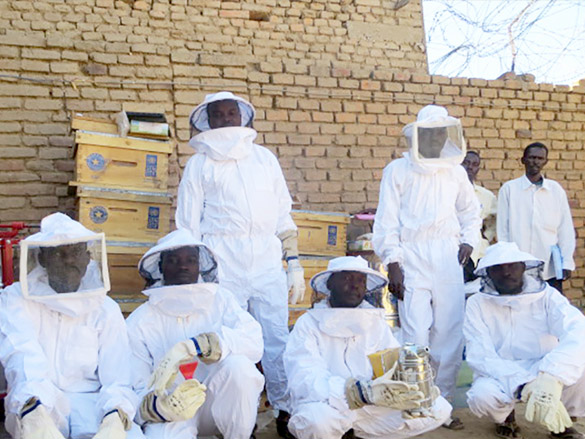Darfur, Sudan (April 4, 2014) – In this recovering region, collaborative beekeeping is one of the ways the Near East Foundation (NEF) is fostering peaceful coexistence among ethnic groups in conflict.
The first-of-its-kind NEF initiative is also helping to generate income and promote economic recovery in rural communities. The work is made possible with funding from the Darfur Community Peace & Stability Fund (DCPSF), administered by the U.N. Development Programme.
As a first step in the process, participants receive beekeeping training from NEF. This includes techniques to safely move beehives, prevent bee migration, and practice production processes that meet international standards for honey quality. Next they receive a small grant to purchase the equipment they need to launch their own business.
A recent course in Darfur attracted 38 men and women from six different ethnic communities. Among them were members of the Misseirya, Fur, and Salamat – all of which have a history of conflict.
The training sessions create a rare opportunity for people from rival groups to come together and interact in ways previously unimaginable. They share equipment, tools and specialized clothing used in honey production and collection. By eating, training, and congregating together, they are able to discover shared interests and common challenges—the foundations of peace.
By the end, participants develop an agreement to share equipment and strategies to help their beekeeping businesses flourish.
Three months after the recent training in Darfur, 20 trainees from the village of Nertiti earned over US $7,600 by selling 1,440 pounds of honey cultivated with their newly acquired skills.
Local buyers lauded its excellence. “Where did all this top quality honey come from?” wondered Nertiti villager Hassan Harka.
Soon afterwards, wholesalers purchased the remaining amount before it reached local markets.
Honey is a major ingredient in traditional medicines — and Darfurian honey is considered to be the best in the country. It is highly sought after in the capital city of Khartoum where it now sells for 5 times more than it did two years ago.
NEF training not only provided these participants with economic independence, a new inter-ethnic network of individuals has developed close relationships with one another. This has positive implications for peace and stability in the region.
By the end of the program, some beneficiaries even suggested changing the name of the workshop to “Beekeeping for Peace and Love!”
Learn more about NEF’s work in Sudan
###
The Near East Foundation is a U.S.-based international NGO leading innovative social and economic development in the Middle East and Africa since 1915. For nearly 100 years, NEF has worked to empower citizens in disadvantaged, vulnerable communities. NEF field staff – all of them from the countries in which they work – partner with local organizations to find grassroots solutions to their development challenges. NEF’s “knowledge, voice, and enterprise” approach is helping build more prosperous, inclusive communities throughout the region. To learn more visit www.neareast.org



